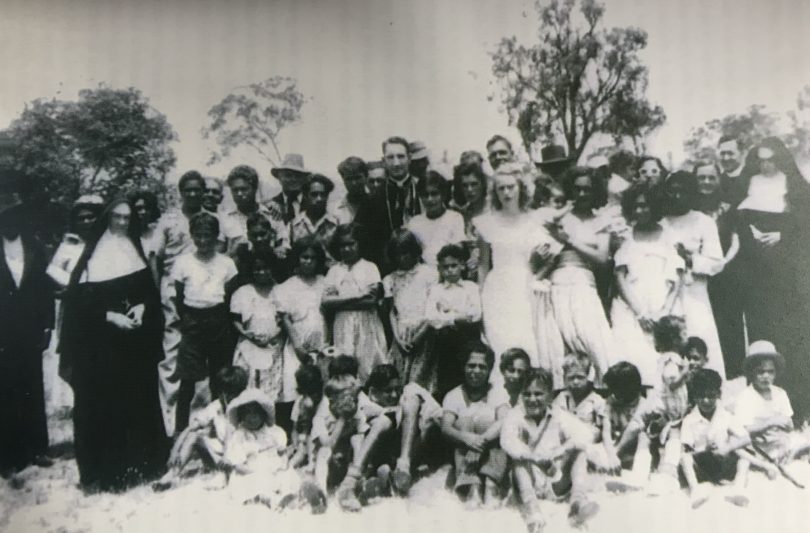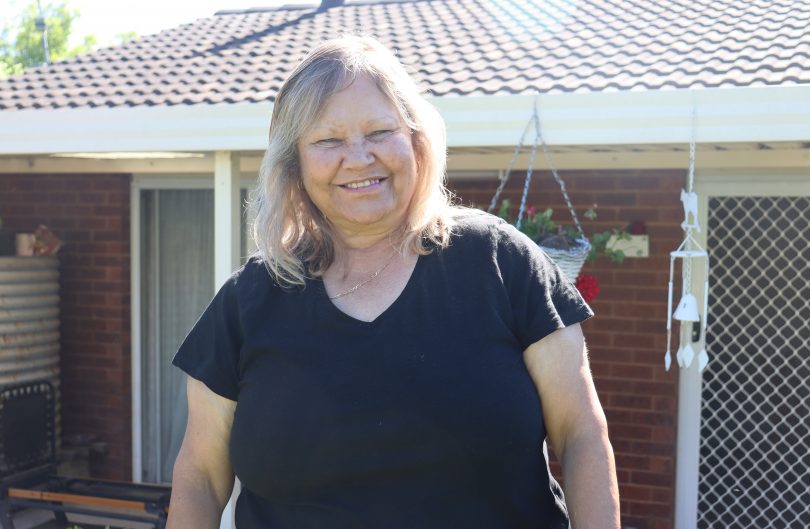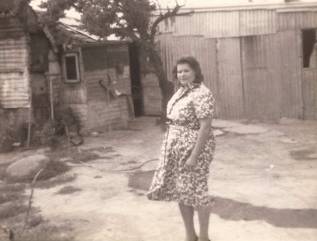
Wendy Brown’s grandfather and siblings are among the residents photographed at Hollywood Mission on Christmas Day in 1952. Photo: Stories of the Ngunnawal book.
Warning: This story includes images and stories of Indigenous people who are deceased.
Wendy Brown, one of the few surviving Ngunnawal people who can recall the harsh conditions at Hollywood Mission and Oak Hill Aboriginal Reserve in Yass, says the racism she experienced as a child has lasted a lifetime.
The 61-year-old was the youngest of 10 children to Oswald ‘Ossie’ Brown and Jean Brown (nee Bell) who lived at Hollywood Mission where housing consisted of bark or tin huts with earth floors, water was collected and carried in buckets, and people required a pass to go to town or work.
By 1937, there were 18 huts at the mission to support a population of 117 people.
Hollywood Mission closed in 1960 and Wendy’s family moved to one of three fibro houses the Aboriginal Protection Board built on Grampian Street, where she was born and raised.
Wendy’s parents and siblings – and other Indigenous people of their generations – rarely talked about life in the mission because they were ashamed. However, the few memories they shared are remembered by Wendy and illustrate the extent of government control over Indigenous people’s lives.
Her family was told to leave Yass when Hollywood Mission closed, but her father – who regularly boxed at the ring inside Yass Hall and was a strict man – protested to the council to stay.
“This was his home – he didn’t want to move on,” says Wendy.
Ossie was granted permission to stay and secured a job with Southern Tablelands County Council in Yass, where he worked for 35 years.
“My parents tried to make a better life for us,” says Wendy.
Family life was fairly good – it was all they knew – but life got worse when Wendy started school and the racism began.

Ngunnawal woman Wendy Brown at home in Yass. Photo: Hannah Sparks.
“I was treated with a lot of racism – black this, black that and you smell,” she says. “They treated us pretty badly. I used to think, ‘I’m just a little girl’. The teachers were aware of the bullying, but the bullies didn’t get into too much trouble. They got away with a lot of this stuff.
“The nuns were cruel and would hit the children with a cane for no reason. You only had to look at the nuns and you knew they had more power. You knew you were black.”
However, Wendy says her grandparents, parents and siblings were treated far worse.
“My mum told me the council had a big hole near Hollywood Mission and an Aboriginal man fell in and died – nothing was done about it,” she says. “Aboriginal people were treated like animals. They’d get sick and die.”
Wendy’s grandparents and parents lived at the Weir Camp down by Yass River before moving to Hollywood Mission. The camp was also known as the Blacks Camp, a name Wendy says Indigenous people can’t escape.
“They used the term ‘the blacks’ that much that we call ourselves the blacks now, too,” she says. “You [a non-Indigenous person] couldn’t use the term, but among the Aboriginal community we use it as a joke. But really, it’s wrong.”

Wendy’s sister, Dixie Byrne (nee Brown), was the last person to live at Oak Hill Aboriginal Reserve in Yass. Photo: Supplied by Dixie’s children.
Indigenous people were moved to reserves and missions after the Protector of Aborigines was appointed in 1881, followed by the Aboriginal Protection Board two years later.
They were forced off the land they knew how to hunt and live on.
While living at Hollywood Mission, Wendy’s mum would ask for leftover food for her family from Mount Carmel Catholic boarding school where she worked in the laundry sometimes. They would also pick up food vouchers and blankets from Yass Police Station and collect secondhand clothes from the Salvation Army in Canberra when possible.
Wendy and some of her siblings were born with blonde hair and blue eyes, inherited from their great grandfather, Tom Brown, who came to Australia on a boat from England and married an Indigenous woman, Clara Woodhouse, from Binalong.
Those who were fairer had a better chance of being allowed into the shops in Yass to buy food, says Wendy.
She would also walk her nieces and nephews over to Coolalie – two hours from Yass by foot – to play in the old schoolhouse where they could pick fruit from a known tree.
Wendy’s mother also passed on some of her cultural practices, including her old language and teaching how to catch crayfish from Yass River from a young age.
Wendy admits her father stole sheep on occasions to kill and provide for his family to eat.
Life was harsh and people were cruel, but perhaps what makes it worse is that systemic racism still exists in Yass, according to Wendy.
“I still feel it today,” she says. “It’s never going to go away. It’s like you can’t escape it. People don’t treat Aboriginal people with respect and I think there should be a cultural awareness program because they don’t know us. They don’t know anything about us – they’re just judging us.”







